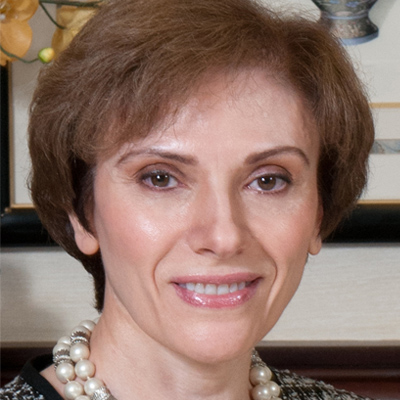Understanding molecular pathways of Parkinson disease and identifying novel targets to develop effective treatments
Wouldn’t it be terrific to have drugs that fully control all the symptoms of Parkinson disease (PD), prevent the complications of currently available treatments, and -- better yet -- slow down disease progression? That’s what patients who suffer from this chronic disabling disorder, their physicians, and the scientific community hope for. Dr. Mary Maral Mouradian, William Dow Lovett Professor of Neurology and Director of the Center for Neurodegenerative and Neuroimmunologic Diseases at Rutgers Biomedical Health Sciences – Robert Wood Johnson Medical School, studies the basic problems that underlie the neurodegeneration in PD and its treatment complications, to identify strategies to interfere with these processes, and develop new drugs that have the potential to impact patients’ quality of life.
Editor-in-Chief of a prestigious scientific journal Neurotherapeutics who has served on a number of national and international research granting agencies, Dr. Mouradian leads a multidisciplinary team of molecular biologists, chemists, and neurologists in identifying new strategies to target the pathologic protein that misfolds and aggregates in the brains of patients with PD with the goal to slow the course of the disease and prevent symptom progression. Her team has also identified a drug that can amend the complications of existing treatments. Currently, Dr. Mouradian and her team continue to investigate various therapeutic approaches and compounds that are at different stages of development, ranging from testing them at the laboratory bench in cells, to validating their efficacy in animal models of the disease, and at least one compound is ready for a clinical trial.
Dr. Mouradian and her team are tackling two major problems that need therapeutic attention in PD:
- Developing Disease Modifying, Neuroprotective Treatments: Disease modifying therapies that slow down the progression of PD remain unavailable despite many hypotheses and large-scale clinical trials, often because proposed therapeutic targets are not critical for disease development or progression. However, knowledge gained in recent years about the genetic underpinnings of PD and the molecular pathways leading to neurodegeneration has provided new therapeutic targets. In particular, the key pathogenic protein in PD is alpha-synuclein, which aggregates abnormally and is associated with a neuroinflammatory response in the brain. To this end, Dr. Mouradian and her team are pursuing new approaches to target alpha-synuclein with the goal to develop disease modifying interventions that alter the course of neurodegeneration, and translate knowledge to novel therapeutic approaches.
- Ameliorating Complications of Existing Treatments: Currently available therapies for PD are associated with adverse effects that increase patient discomfort and interfere with daily functioning. One such common side effect is the development of involuntary movements known as L-dopa induced dyskinesia (LID). Although considered the gold standard treatment of PD, L-dopa is far from an ideal drug, and the medical management of these involuntary movements continues to be suboptimal. Dr. Mouradian and her team have recently found a drug to suppress LID and are planning to advance this finding to the clinic.
Bio
Mary Maral Mouradian, M.D., is the William Dow Lovett Professor of Neurology and Director of the Center for Neurodegenerative and Neuroimmunologic Diseases at Rutgers Biomedical and Health Sciences - Robert Wood Johnson Medical School. She also serves as Director of Research in the Department of Neurology at the medical school. In addition, she holds joint professorships in the Department of Neuroscience and Cell Biology and in the Department of Biochemistry and Molecular Biology in the same institution.
Even at a young age, Dr. Mouradian was interested in becoming a physician scientist, particularly intrigued by the brain that she calls the “last frontier of humanity.” Dr. Mouradian obtained her medical degree with distinction from the American University of Beirut and neurology training at the University of Cincinnati Medical Center. She then joined the US National Institutes of Health (NIH) where she received postdoctoral training in clinical pharmacological research in Parkinson disease (PD) and other neurodegenerative diseases in the laboratory of Thomas Chase of the National Institute of Neurological Disorders and Stroke (NINDS).
She received additional training in molecular biology under the tutelage of the Nobel Laureate Marshall Nirenberg at the National Heart, Lung and Blood Institute. During the last thirteen years of her eighteen year NIH tenure, Dr. Mouradian directed the Genetic Pharmacology Unit of the NINDS. Her early work focused on the clinical neuropharmacology of levodopa, describing key pharmacodynamic alterations indicative of the brain's plasticity in response to pulsatile therapies. These seminal contributions provided the rationale for the development of continuous therapeutic modalities for PD. In addition, her team described a series of fundamental findings about the transcriptional regulation of dopamine receptor genes and identified and cloned transcription factors involved in modulating their expression.
For more information, visit http://rwjms.rutgers.edu/departments_institutes/neurology/research/disease.html
http://rwjms.rutgers.edu/departments_institutes/neurology/faculty/mouradian.html
Publications
Awards
Outstanding Medical Research Scientist Award, 2015
Edward J. Ill Excellence in Medicine Foundation
Excellence in Research Award, 2013
New Jersey Health Foundation
Roger Duvoisin Research Scholar Award, 2003
American Parkinson Disease Association
NIH Award of Merit 1992
National Institute of Health
Alpha Omega Alpha Honor Medical Society elected member 1981
Patents
Application Numbers US20120129912, WO2010129791: "RNA Targeting in alpha-Synucleinopathies."
Inventors: Mary Maral Mouradian, Eunsung Junn.
Application Numbers: US20140221415, WO2012149113: "Method of Treating Dyskinesia."
Inventors: M. Maral Mouradian, Steven Braithwaite, Michael Voronkov.


